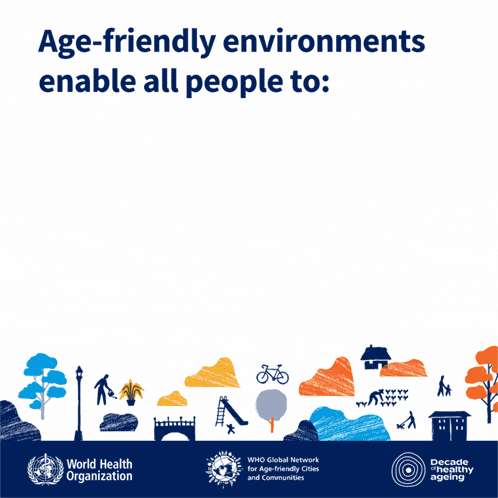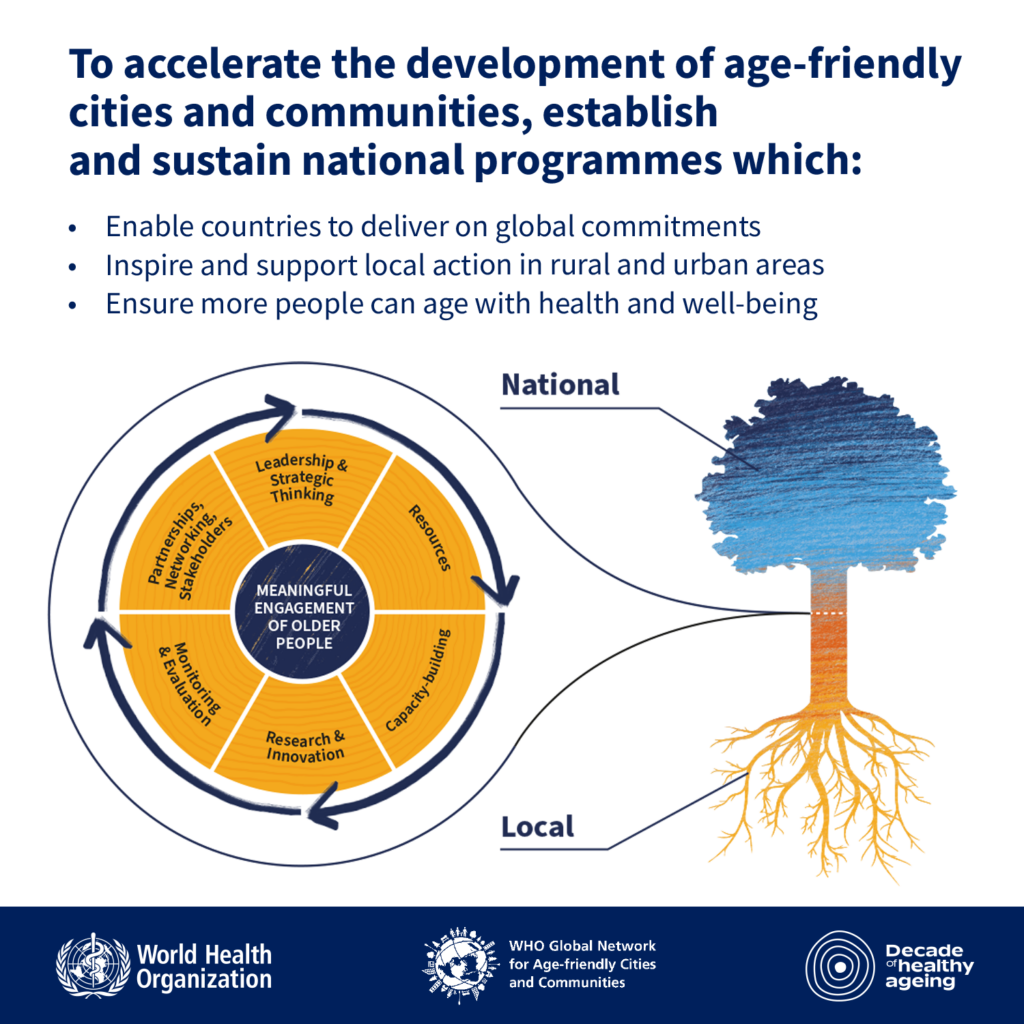As the global population rapidly ages, the concept of age-friendly cities is gaining prominence. These cities aim to enhance the quality of life for older adults, irrespective of their physical or cognitive abilities.
Age-friendly environments foster healthy and active ageing by building and maintaining intrinsic capacity across the life course and enabling greater functional ability in someone with a given level of capacity [1].
Discover how age-friendly cities bring forth economic and social benefits in an era where meeting the needs of older generations is paramount.

Benefits of Age-friendly Cities
Economic Benefits
One of the primary benefits of creating age-friendly cities is the stimulation of local economies. Older generations often possess greater economic clout compared to younger ones. For instance, people over 50 are responsible for a significant portion of economic activity, spending on consumer goods and services like local stores and restaurants. This demographic, as reported by Oxford Economics, comprises over 106 million individuals in the U.S. alone, contributing approximately $4.6 trillion in economic activity [2].
Over 106 million individuals in the U.S. alone, contributing approximately $4.6 trillion in economic activity.
Age-friendly cities can offer a multitude of advantages, including the potential for increased tax revenue. By investing in infrastructure and services that cater to the needs of older adults, cities can attract businesses that specialise in serving this demographic.
These businesses may include developers of senior housing, providers of home modification services, and companies offering ageing-in-place solutions. As a wealthy generation ages, the purchasing power of older adults remains strong, solidifying their position as an influential consumer segment.
Establishing age-friendly cities offers a chance for urban areas to capitalise on this market, bolstering their economy while simultaneously fostering the well-being of their older inhabitants. This approach recognises that older adults don’t necessarily gain more means as they age, but rather, it is the ageing of an already affluent generation that maintains their financial significance.

Age-friendly cities can potentially reduce healthcare costs by providing affordable and easily accessible healthcare services, with an emphasis on preventive care. This approach can lead to a decrease in chronic health conditions, not only alleviating the strain on the strain on the healthcare system but also generating additional tax revenue for local governments.
Cities that offer a high quality of life in retirement can attract retirees who have significant purchasing power, creating new economic opportunities for local businesses. Moreover, an age-friendly city can attract and retain a highly skilled workforce. As the baby boomer generation retires, there is an increasing need for skilled workers in fields such as health care, education, and finance. By supporting senior people to continue working and contributing to the economy, age-friendly cities can address this need for skilled workers.
Improved Health and Wellness
Age-friendly cities directly contribute to the physical and mental health of their residents. By implementing infrastructure that encourages physical activity, like walking and biking paths, these cities optimise happiness and independence for older adults. This approach not only combats social isolation but also uplifts the spirits and energy levels of individuals, as highlighted in “The Longevity Project” by Friedman and Martin [2].
Intergenerational Engagement
Age-friendly communities offer essential social benefits, including the promotion of social connections and the reduction of social isolation among older adults. By creating a welcoming and inclusive community for people of all ages, age-friendly cities help mitigate the risk of social isolation and loneliness.
Moreover, these cities foster intergenerational connections and learning through accessible public spaces and programs. These opportunities for older adults to mentor younger generations and vice versa promote social cohesion, community building, and personal growth for all community members.
Creating environments that facilitate interaction among different generations fosters a sense of purpose and connection. According to a study by the Stanford Center on Longevity, in collaboration with Encore.org and the David and Lucile Packard Foundation, such environments not only benefit older adults by providing them with a sense of fulfillment but also aid in the development of interpersonal skills and meaningful relationships across all ages [2].
Ageing in Place
As defined by the World Health Organization (WHO), ageing in place allows older adults to live safely, independently, and comfortably in their own homes and communities, irrespective of age, income, or ability level. This concept is central to age-friendly cities, ensuring that the elderly can continue to be active and participatory members of their communities [3].
Furthermore, creating a community that caters to a diverse range of senior needs can encourage older adults to remain in the area longer, resulting in increased tax income, consumption, and local commerce. As such, developing an age-friendly city becomes a cost-effective strategy benefiting both older adults and the broader community. It is essential to recognise that attaining an age-friendly city may necessitate multiple rounds of planning and implementation to ensure that older adults’ needs are comprehensively addressed, with prevention being a critical component.
Accessible Housing and Public Spaces
To support ageing in place, modifications in housing and public spaces are necessary. This includes widening doorways for mobility devices, installing curbless walk-in showers, and ensuring sidewalks are wide, slip-resistant, and free of obstacles. Additionally, public areas need accessible benches, seating, and restrooms to accommodate seniors or those temporarily injured or ill [3].
Health and Recreational Facilities
Access to health and recreational facilities is vital for older adults to maintain physical health and social connections. New York City, a member of The WHO Global Network for Age-Friendly Cities and Communities, exemplifies this by incorporating senior hours in city pools. Such facilities should be within walking distance of senior residences and offer integrated activities that include all age groups [3].
Junoverse’s Role in Age-friendly Communities
Junoverse plays a pivotal role in supporting age-friendly communities by enhancing the health, happiness, and engagement of the ageing population. With our customisable ecosystem of solutions designed to enhance age-friendliness, Junoverse assists companies and governments in creating a society that is healthy, engaged, and productive. Discover how CONNECT™ can help your area become age-friendly the fastest way possible.

Scalability, interoperability, and multi-stakeholder engagement are critical elements that drive the success of these efforts. By investing in the well-being of older adults, Junoverse promotes age-friendly cities, demonstrating its commitment to corporate social responsibility, diversity, and inclusion.
For more insights, watch the video below, powered by WHO, explaining how age-friendly cities benefit everyone or explore their interactive map and learn which cities and communities already participate in the WHO Initiative.
References
[1] World Health Organization. (2023). Age-friendly in practice.
[2] Emerald X. (2019). 3 Benefits Of Creating Age-Friendly Cities.
[3] Rick Hansen Foundation (2019). Age-friendly cities and aging in place.